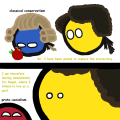No edit summary |
No edit summary |
||
| Line 22: | Line 22: | ||
Montagnardism<br> | Montagnardism<br> | ||
First Generation of the Political Defined Left (According to Gustavo Bueno and his followers)<br> | First Generation of the Political Defined Left (According to Gustavo Bueno and his followers)<br> | ||
Reign of Terror<br> | [[File:TERROR.png]] Reign of Terror<br> | ||
[[File:Jabotite.png]] [[Jacobitism]] (Erroneously)<br> | [[File:Jabotite.png]] [[Jacobitism]] (Erroneously)<br> | ||
[[File:AuthRad.png]] Authoritarian Radicalism <br> | [[File:AuthRad.png]] Authoritarian Radicalism <br> | ||
Revision as of 12:08, 3 March 2024
 |
This page is about an important IRL ideology "This knowledge is essential to political science!" - Scientocracy This page is about an ideology that not only exists in the real world, but is also of reasonable importance. Please do not make major edits to this page without citing sources, so that it may stay accurate. |
Not to be confused with
Jacobitism.
“To punish the oppressors of humanity is clemency; to forgive them is cruelty. The severity of tyrants has barbarity for its principle; that of a republican government is founded on beneficence. Therefore let him beware who should dare to influence the people by that terror which is made only for their enemies! Let him beware, who, regarding the inevitable errors of civism in the same light, with the premeditated crimes of perfidiousness, or the attempts of conspirators, suffers the dangerous intriguer to escape and pursues the peaceable citizen! Death to the villain who dares abuse the sacred name of liberty or the powerful arms intended for her defence, to carry mourning or death to the patriotic heart…”
![]() Jacobinism
Jacobinism ![]() , also called Montagnardism is an
, also called Montagnardism is an ![]() authoritarian,
authoritarian, ![]() radical liberal
radical liberal ![]() revolutionary ideology that originates from the age of
revolutionary ideology that originates from the age of ![]() enlightenment (18th century) and that advocates for a
enlightenment (18th century) and that advocates for a ![]() revolution against the
revolution against the ![]() traditional european society
traditional european society ![]() and establishment of an egalitarian
and establishment of an egalitarian ![]() Republic.
Republic.
Their influence is far and wide, as they are the parent of ![]() Socialism and
Socialism and ![]() Philosophical Anarchism, the grandparent of
Philosophical Anarchism, the grandparent of ![]() Marxism, and the great granduncle of
Marxism, and the great granduncle of ![]() Progressivism which in turn makes them the close ancestor of most ideologies in the left side of the compass.
Progressivism which in turn makes them the close ancestor of most ideologies in the left side of the compass.
They are infamous for the role they took in the ![]() French Revolution and for being responsible for the subsequent reign of terror, whereby means of their favorite weapon, the guillotine, everyone deemed to be
French Revolution and for being responsible for the subsequent reign of terror, whereby means of their favorite weapon, the guillotine, everyone deemed to be ![]() counter-revolutionary was executed.
counter-revolutionary was executed.
History
Name Origin
The ![]() Jacobins
Jacobins ![]() got their name from the fact that their club, the Breton Club, and later the Society of Friends of the Constitution, met in the convent of the Dominicans, or
got their name from the fact that their club, the Breton Club, and later the Society of Friends of the Constitution, met in the convent of the Dominicans, or ![]() Jacobins
Jacobins ![]() , on Rue Saint-Honoré in Paris. Formed by men from the urban petty bourgeoisie, the
, on Rue Saint-Honoré in Paris. Formed by men from the urban petty bourgeoisie, the ![]() Jacobins
Jacobins ![]() were recognized in history mainly for their
were recognized in history mainly for their ![]() radical republicanism and also for the
radical republicanism and also for the ![]() centralizing role played by the State in the
centralizing role played by the State in the ![]() revolutionary process.
revolutionary process.
At first, the ![]() Jacobins
Jacobins ![]() were just members of a
were just members of a ![]() Masonic club called the
Masonic club called the ![]() Jacobin Club
Jacobin Club ![]() – which, in turn, had such a name because it was located in the Convent of São Tiago (in the original French, Jacques or Jacob). Some nobles and several rich bourgeois belonged to the group; among these were important characters for the Revolution that would soon take place, such as
– which, in turn, had such a name because it was located in the Convent of São Tiago (in the original French, Jacques or Jacob). Some nobles and several rich bourgeois belonged to the group; among these were important characters for the Revolution that would soon take place, such as ![]() Jacques-Pierre Brissot, who would lead the
Jacques-Pierre Brissot, who would lead the ![]() Girondin faction, and
Girondin faction, and ![]() Maximilien Robespierre, who would lead the
Maximilien Robespierre, who would lead the ![]() Jacobins
Jacobins ![]() .
.
French Revolution of 1789
The French Revolution was a period of political and societal change in ![]() France that began with the Estates General of 1789, and ended with the coup of 18 Brumaire on November 1799 and the formation of the French Consulate. Many of its ideas are considered fundamental principles of liberal democracy, while its values and institutions remain central to modern French political discourse.
France that began with the Estates General of 1789, and ended with the coup of 18 Brumaire on November 1799 and the formation of the French Consulate. Many of its ideas are considered fundamental principles of liberal democracy, while its values and institutions remain central to modern French political discourse.
The causes are generally agreed to be a combination of social, political and economic factors, which the Ancien Régime proved unable to manage. A financial crisis and widespread social distress led, in May 1789, to the convocation of the Estates General which was converted into a National Assembly in June. The Storming of the Bastille on 14 July led to a series of radical measures by the Assembly, among them the abolition of feudalism, state control over the ![]() Catholic Church in France, and a declaration of rights.
Catholic Church in France, and a declaration of rights.
The next three years were dominated by the struggle for political control, exacerbated by economic depression. A series of military defeats following the outbreak of the French Revolutionary Wars in April 1792 resulted in the Insurrection of 10 August 1792. The monarchy was abolished and replaced by the French First Republic in September, while Louis XVI was executed in January 1793.
After another Paris-based revolt in June 1793, the ![]() constitution was suspended and effective political power passed from the
constitution was suspended and effective political power passed from the ![]() National Convention to the Committee of Public Safety. An estimated 16,000 were executed in the subsequent
National Convention to the Committee of Public Safety. An estimated 16,000 were executed in the subsequent ![]() Reign of Terror, which ended in July 1794. Weakened by external threats and internal opposition, the Republic was replaced in November 1795 by the
Reign of Terror, which ended in July 1794. Weakened by external threats and internal opposition, the Republic was replaced in November 1795 by the ![]() Directory (1795-1799). Four years later in November 1799, the Consulate seized power in a military coup led by
Directory (1795-1799). Four years later in November 1799, the Consulate seized power in a military coup led by ![]() Napoleon Bonaparte. This is generally seen as marking the end of the Revolutionary period.
Napoleon Bonaparte. This is generally seen as marking the end of the Revolutionary period.
Deposition of the Monarchy
During the French Revolution, the proclamation of the ![]() abolition of the monarchy (French: Proclamation de l'abolition de la royauté) was a proclamation by the
abolition of the monarchy (French: Proclamation de l'abolition de la royauté) was a proclamation by the ![]() National Convention of France announcing that it had abolished the
National Convention of France announcing that it had abolished the ![]() French monarchy on 21 September 1792, giving birth to the
French monarchy on 21 September 1792, giving birth to the ![]() French First Republic.
French First Republic.
Founding of the National Convention
W.I.P
Red Terror
W.I.P
Thermidor coup and decline
W.I.P
Variants
 Jacobin Club
Jacobin Club
W.I.P

 Cordeliers Club
Cordeliers Club
W.I.P
Beliefs
 Republicanism: The
Republicanism: The  Jacobins
Jacobins  were staunch proponents of
were staunch proponents of  republicanism, advocating for the overthrow of the
republicanism, advocating for the overthrow of the  monarchy and the establishment of a
monarchy and the establishment of a  democratic republic. They believed in the sovereignty of the people and the elimination of hereditary privilege.
democratic republic. They believed in the sovereignty of the people and the elimination of hereditary privilege.
 Popular Sovereignty: The
Popular Sovereignty: The  Jacobins
Jacobins  emphasized the concept of
emphasized the concept of  popular sovereignty, asserting that political power should reside with the citizens and be exercised through representative institutions. They sought to empower the masses and ensure their active participation in political decision-making.
popular sovereignty, asserting that political power should reside with the citizens and be exercised through representative institutions. They sought to empower the masses and ensure their active participation in political decision-making.
 Equality: The
Equality: The  Jacobins
Jacobins  advocated for
advocated for  social equality and the abolition of social hierarchies. They rejected the privileges of the nobility and sought to create a more
social equality and the abolition of social hierarchies. They rejected the privileges of the nobility and sought to create a more  egalitarian society based on merit and civic virtue.
egalitarian society based on merit and civic virtue.
 Liberty: The
Liberty: The  Jacobins
Jacobins  placed great importance on individual and political liberties. They championed freedom of speech, press, and association, seeking to protect these rights as essential elements of a democratic society.
placed great importance on individual and political liberties. They championed freedom of speech, press, and association, seeking to protect these rights as essential elements of a democratic society.
 Virtue and Civic Duty: The
Virtue and Civic Duty: The  Jacobins
Jacobins  believed in the cultivation of virtue and the fulfillment of civic duties as essential components of active citizenship. They promoted civic education and moral values as a means to create an engaged and responsible citizenry.
believed in the cultivation of virtue and the fulfillment of civic duties as essential components of active citizenship. They promoted civic education and moral values as a means to create an engaged and responsible citizenry.
 Centralization of Power: The
Centralization of Power: The  Jacobins
Jacobins  supported a strong central government and centralization of power. They believed that a unified and centralized state was necessary to implement their reforms and defend the republic against counter-revolutionary forces.
supported a strong central government and centralization of power. They believed that a unified and centralized state was necessary to implement their reforms and defend the republic against counter-revolutionary forces.
 Revolutionary Justice: The
Revolutionary Justice: The  Jacobins
Jacobins  implemented a policy of revolutionary justice, aiming to safeguard the revolution and punish its enemies. They established the Committee of Public Safety and conducted trials and executions of perceived counter-revolutionaries, which led to a period known as the Reign of Terror.
implemented a policy of revolutionary justice, aiming to safeguard the revolution and punish its enemies. They established the Committee of Public Safety and conducted trials and executions of perceived counter-revolutionaries, which led to a period known as the Reign of Terror.
 Nationalism: The
Nationalism: The  Jacobins
Jacobins  promoted a strong sense of
promoted a strong sense of  nationalism, emphasizing the unity and sovereignty of the French nation. They sought to spread their revolutionary ideals beyond French borders, encouraging the export of the revolution and supporting nationalist uprisings in other countries.
nationalism, emphasizing the unity and sovereignty of the French nation. They sought to spread their revolutionary ideals beyond French borders, encouraging the export of the revolution and supporting nationalist uprisings in other countries.
 Secularism: The
Secularism: The  Jacobins
Jacobins  advocated for the separation of church and state. They sought to limit the influence of religion in political affairs and replace traditional religious practices with a more rational and secular civic cult.
advocated for the separation of church and state. They sought to limit the influence of religion in political affairs and replace traditional religious practices with a more rational and secular civic cult.
 Revolutionary Internationalism: While primarily focused on the French Revolution, the
Revolutionary Internationalism: While primarily focused on the French Revolution, the  Jacobins
Jacobins  supported the idea of international solidarity among revolutionary movements. They envisioned a global struggle against monarchies and aristocracies, advocating for the spread of revolutionary principles throughout Europe and beyond.
supported the idea of international solidarity among revolutionary movements. They envisioned a global struggle against monarchies and aristocracies, advocating for the spread of revolutionary principles throughout Europe and beyond.
Personality
![]() Jacobin
Jacobin ![]() is usually presented somewhat as a (French) maniac who really likes to chop off the heads of anyone who goes against le Republique including royals as well as normal French citizens.
is usually presented somewhat as a (French) maniac who really likes to chop off the heads of anyone who goes against le Republique including royals as well as normal French citizens.
How to Draw

Drawing Jacobin requires a few steps:
- Draw a ball
- Draw a Phrygian cap on top
- Draw a French cockade on the cap
- Fill both the cap and the ball with red
- Draw 2 intertwined branches in black in the ball
- Add the eyes and you're done
| Color Name | HEX | RGB | |
|---|---|---|---|
| Blue | #0055A4 | 0, 85, 164 | |
| White | #FFFFFF | 255, 255, 255 | |
| Light Red | #EF4135 | 239, 65, 53 | |
| Red | #FE0010 | 254, 0, 16 | |
| Black | #141414 | 20, 20, 20 | |
Relations
Camarades
 Left-Wing Populism - Hell yes, rally the people!
Left-Wing Populism - Hell yes, rally the people! Republicanism - Best brother who loves to kill monarchs. Liberté! Égalité! Fraternité!
Republicanism - Best brother who loves to kill monarchs. Liberté! Égalité! Fraternité! Neo-Jacobinism - Tradition is oppression!
Neo-Jacobinism - Tradition is oppression! Marxism - My grandson who considers me to be an important democratic anti-feudal revolutionary.
Marxism - My grandson who considers me to be an important democratic anti-feudal revolutionary. Leninism - My favourite grandchild!
Leninism - My favourite grandchild! Marxism–Leninism - My great-great-grandson that loves me.
Marxism–Leninism - My great-great-grandson that loves me. Maoism - My great-great-grandson whom I greatly admire for how he deals with traditionalism.
Maoism - My great-great-grandson whom I greatly admire for how he deals with traditionalism. Liberalism - I am definitely one of you.
Liberalism - I am definitely one of you. Radicalism - Yes! Fight the reactionary monarchists!
Radicalism - Yes! Fight the reactionary monarchists! National Liberalism - Carrying on my legacy and kicking monarchist butt in 1848!
National Liberalism - Carrying on my legacy and kicking monarchist butt in 1848! Babouvism - Carried on my legacy and started something great. I wish you succeeded...
Babouvism - Carried on my legacy and started something great. I wish you succeeded... Utopian Socialism - I am kind of a form of you.
Utopian Socialism - I am kind of a form of you. Ochlocracy - IF THE MOB WANTS YOU DEAD, YOU DIE! À LA GUILLOTINE!
Ochlocracy - IF THE MOB WANTS YOU DEAD, YOU DIE! À LA GUILLOTINE! Philosophical Anarchism - Thank you for your support!
Philosophical Anarchism - Thank you for your support! De Francism - My son that took my ideas even further.
De Francism - My son that took my ideas even further. Kemalism - My Turkish friend.
Kemalism - My Turkish friend. Tridemism - My Chinese friend.
Tridemism - My Chinese friend. Fascism (After 1943) - I always knew you would stay true to me! Traitorous king and parliament who sided with foreigners against you my grandson.[4]
Fascism (After 1943) - I always knew you would stay true to me! Traitorous king and parliament who sided with foreigners against you my grandson.[4] Posadism - You want to
Posadism - You want to  erase the past with explosives? I will help you with all enthusiasm!
erase the past with explosives? I will help you with all enthusiasm!
Neutre
 Democracy - There's no need to vote on whether or not we should kill all counter-revolutionaries.
Democracy - There's no need to vote on whether or not we should kill all counter-revolutionaries. Constitutionalism - What about the constitution? I'm busy killing people, talk to me later!
Constitutionalism - What about the constitution? I'm busy killing people, talk to me later! Classical Liberalism - The American revolution had a great influence on my ideas but you were too lukewarm on slavery and the glorious revolution was monarchist, fake revolutionary.
Classical Liberalism - The American revolution had a great influence on my ideas but you were too lukewarm on slavery and the glorious revolution was monarchist, fake revolutionary. Socialism - We have often been allies but I technically am still a liberal and enjoy private property.
Socialism - We have often been allies but I technically am still a liberal and enjoy private property. Enlightenment Thought - Rousseau was a great theorist to Robespierre.
Enlightenment Thought - Rousseau was a great theorist to Robespierre. What do you mean France is too big for a Republic? La Plaineism - You're actually more willing to work with us. Great! The revolution will continue to live on, just as long as you remain on our side and support our Reign of Terror.
La Plaineism - You're actually more willing to work with us. Great! The revolution will continue to live on, just as long as you remain on our side and support our Reign of Terror. Wait, what do you mean you don't hold partisan alliances? And why did you originally side with them?
them? Dantonism - You helped set up a Committee of Public Safety to catch opponents, but you were corrupt so you got replaced.
Dantonism - You helped set up a Committee of Public Safety to catch opponents, but you were corrupt so you got replaced. Jeffersonian Democracy - Thanks for your support but you're too much like
Jeffersonian Democracy - Thanks for your support but you're too much like  him.
him. Progressivism - You're not going far enough.
Progressivism - You're not going far enough. State Atheism - I too hate Christianity, but Robespierre is our divine saviour who freed France from tyranny! Of course we should worship him!
State Atheism - I too hate Christianity, but Robespierre is our divine saviour who freed France from tyranny! Of course we should worship him! Fascism (Until 1943) - You tried it, but keeping the king on the throne was a mistake.
Fascism (Until 1943) - You tried it, but keeping the king on the throne was a mistake.
À LA GUILLOTINE!
 Girondism - You may have originally been a fellow comrade in the Revolution, but you became counter-revolutionary against my goals. À LA GUILLOTINE!
Girondism - You may have originally been a fellow comrade in the Revolution, but you became counter-revolutionary against my goals. À LA GUILLOTINE! Feuillantism - Why on earth do you want to keep the king? À LA GUILLOTINE!
Feuillantism - Why on earth do you want to keep the king? À LA GUILLOTINE! Thermidorianism - What do you mean it's my turn to die at the guillotine? À LA GUILLO- ARGH, my jaw!
Thermidorianism - What do you mean it's my turn to die at the guillotine? À LA GUILLO- ARGH, my jaw! Absolute Monarchism - À LA GUILLOTINE!
Absolute Monarchism - À LA GUILLOTINE! Monarcho-Fascism - You're just like the man above!
Monarcho-Fascism - You're just like the man above! Constitutional Monarchism - Your constitution will not save you. À LA GUILLOTINE!
Constitutional Monarchism - Your constitution will not save you. À LA GUILLOTINE! Monarcho-Capitalism - King and an elitist? À LA GUILLOTINE!
Monarcho-Capitalism - King and an elitist? À LA GUILLOTINE! Monarcho-Distributism - I don't care about owning property! À LA GUILLOTINE!
Monarcho-Distributism - I don't care about owning property! À LA GUILLOTINE! Feudalism - À LA GUILLOTINE!
Feudalism - À LA GUILLOTINE! Catholic Theocracy - À LA GUILLOTINE!
Catholic Theocracy - À LA GUILLOTINE! Traditionalism - À LA GUILLOTINE!
Traditionalism - À LA GUILLOTINE! Conservatism - À LA GUILLOTINE!
Conservatism - À LA GUILLOTINE! Classical Conservatism - À LA GUILLOTINE!
Classical Conservatism - À LA GUILLOTINE! National Conservatism - You would unite the nation under reactionary thought? À LA GUILLOTINE!
National Conservatism - You would unite the nation under reactionary thought? À LA GUILLOTINE! Authoritarian Conservatism - Army of the King! À LA GUILLOTINE!
Authoritarian Conservatism - Army of the King! À LA GUILLOTINE! Nazism- Arch Reactionary, À LA GUILLOTINE!
Nazism- Arch Reactionary, À LA GUILLOTINE! Hamiltonianism - The American Feuillant! À LA GUILLOTINE!
Hamiltonianism - The American Feuillant! À LA GUILLOTINE! Reactionaryism - Stop trying to undo my f*cking work! À LA GUILLOTINE!
Reactionaryism - Stop trying to undo my f*cking work! À LA GUILLOTINE! Neoreactionaryism - Why the f*ck do you keep trying to undo my work? À LA GUILLOTINE!
Neoreactionaryism - Why the f*ck do you keep trying to undo my work? À LA GUILLOTINE! Conservative Liberalism - Compromise? À LA GUILLOTINE!
Conservative Liberalism - Compromise? À LA GUILLOTINE! Christian Liberalism - Fake liberal, À LA GUILLOTINE!
Christian Liberalism - Fake liberal, À LA GUILLOTINE! Civil Libertarianism - Crypto Reactionary! À LA GUILLOTINE!
Civil Libertarianism - Crypto Reactionary! À LA GUILLOTINE! Apoliticism - Apathy? À LA GUILLOTINE!
Apoliticism - Apathy? À LA GUILLOTINE! Alt-Lite - Modern Girondin. À LA GUILLOTINE!
Alt-Lite - Modern Girondin. À LA GUILLOTINE! Kleptocracy - Thief? À LA GUILLOTINE!
Kleptocracy - Thief? À LA GUILLOTINE! Reactionary Socialism - Your compassion is fake! À LA GUILLOTINE!
Reactionary Socialism - Your compassion is fake! À LA GUILLOTINE! Jacobitism - We are nothing alike! À LA GUILLOTINE, monarchist swine!
Jacobitism - We are nothing alike! À LA GUILLOTINE, monarchist swine! French Fascism - WTF? À LA GUILLOTINE, bootlicking traitor!
French Fascism - WTF? À LA GUILLOTINE, bootlicking traitor! Longism - Every man a king? Challenge accepted, À LA GUILLOTINE! WE WILL GUILLOTINE ALL THOSE WHO YOU HAVE MADE INTO KINGS!!
Longism - Every man a king? Challenge accepted, À LA GUILLOTINE! WE WILL GUILLOTINE ALL THOSE WHO YOU HAVE MADE INTO KINGS!!
Further Information
Literature
- Treatise on the Social Compact, Or, The Principles of Political Law or just The Social Contract by Jean-Jacques Rousseau
- The Great French Revolution by
 Peter Kropotkin
Peter Kropotkin - The Oxford History of the French Revolution (Preview) by William Doyle
- The Twelve who Ruled: The Year of Terror in the French Revolution ([2]) by R.R. Palmer
- Fatal Purity: Robespierre and the French Revolution (Preview) by Ruth Scurr
- A Place Greater than Safety by Hilary Mantel
Wikipedia
- Jacobin Club
- Jacobinism
- Montagnards
- Herbertism
- Maximilien Robespierre
- Jacques Hébert
- Georges Danton
- Reign of Terror
Videos
Gallery
-
Credit: u/The-Posadist, Source
-
Credit: u/marty_mcclarkey_1791, Source
-
Credit: u/BoIuWot, Source
-
Credit: u/Viharu, Source
-
Credit: u/character-confusion, Source
-
Credit:TrixOfTheTrade, Source
-
Credit: u/AndalusianUnion, Source
-
Credit: u/K-Tech, Source
-
-
-
-
Jacobinism by
 Anthony Bax
Anthony Bax
-
FreePCB Design by
 Anthony Bax
Anthony Bax
-
Normal Version by Julius M. Étikus
-
FreePCB Design by Julius M. Étikus
Further Information
References
- ↑ https://en.wikipedia.org/wiki/Tipu_Sultan
- ↑ https://en.wikipedia.org/wiki/Jacobin_Club_of_Mysore
- ↑ https://thewire.in/history/the-citizen-sultan-a-jacobin-club-in-india
- ↑ “Fascism saw the French Revolution as a whole through the eyes of the Jacobin dictatorship, and it was this aspect of the Revolution which exercised its influence upon it.” “This nationalism provides the link between the French Revolution and fascism: the nationalization of the masses was a common bond between the French and the fascist revolutions”. [1]
| | |
| | |
| Canon | |
|---|---|












